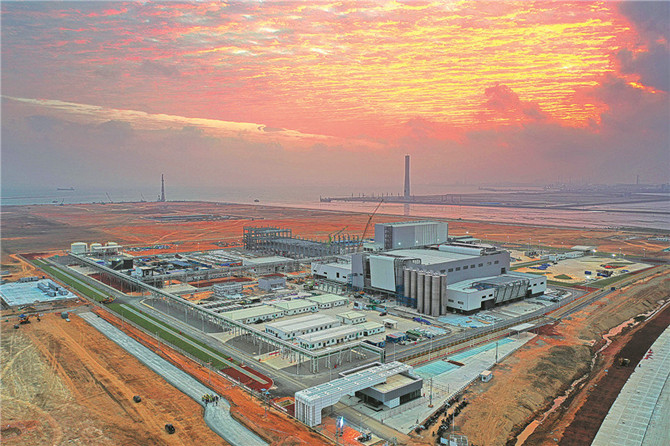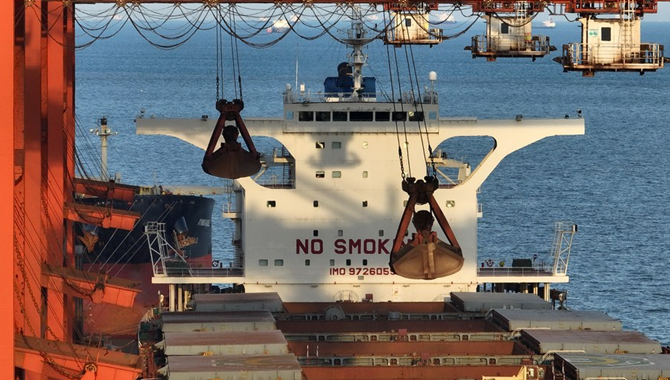A ship unloading cargo at the ore wharf in Caofeidian Port area, Tangshan Port, in north China's Hebei Province, July 18, 2022. /Xinhua
With the lingering impact of COVID-19 and negative spillover from the situation in Ukraine, the global economy, which has already shown a loss of momentum, is facing uncertainties.
Continued fiscal and monetary tightening to bring down inflation in several countries, coupled with supply chain disruptions and decreasing industrial production, further dim global economic prospects.
The Institute of International Finance forecasts that global economic growth will be low but net positive at around 1.2 percent in 2023 and that declines in consumer and business confidence will cause a 2.0 percent decline in average annual GDP growth in Europe.
In the face of multiple challenges, China has maintained the stability of its economy during the pandemic. It was among the world's first countries to resume work and reopen businesses in 2020 and became the only major economy to attain positive growth this year.
"China has managed to minimize the pandemic's impact on its supply chains and business operations," said Professor Liu Bin at the China Institute for WTO Studies of the University of International Business and Economics.
"Due to China's large role in global trade, its optimized measures and recent adjustments in pandemic response could inject vitality and provide a timely boost to the global economy."
China will end its quarantine requirements for international arrivals on January 8, according to the national health authorities. The policy is among the latest steps in reopening the country.
Searches for popular cross-border destinations skyrocketed tenfold within half an hour of the announcement of eased travel restrictions. Meanwhile, searches for flight tickets and international hotels reached a three-year peak, according to data from Chinese travel platform Ctrip.
"After refining its epidemic policies, Chinese economic growth is going to rebound in 2023," Liu told CGTN.
Lu said the speed of the rebound is expected to be faster domestically than in the international market and that it is important for boosting confidence in the global economic recovery.
Foreign financial institutions also expressed optimism about the Chinese economy in the wake of the country's optimization of pandemic prevention measures. J.P. Morgan Asset Management's forecast shows that China's GDP growth is expected to rebound to 5.4 percent in 2023. Meanwhile, according to analysts at U.S. investment bank Goldman Sachs, the overall economic outlook is positive despite a rise in infection cases.
Foreign companies remain enthusiastic about investing in China despite the COVID-19 backdrop, with foreign direct investment in the Chinese mainland rising by 17.4 percent year on year to $168.3 billion in the first 10 months of 2022, according to the Ministry of Commerce.
In a report released in September 2022 by the American Chamber of Commerce in South China, 76 percent of American companies said they will reinvest in China by the end of 2022 to expand existing operations.
"Ultimately, working together is the way of the future," said Harley Seyedin, president of the American Chamber of Commerce in South China, adding that China will continue to prosper in a peaceful manner that will contribute to the world.
Meanwhile, German foreign direct investment in the Chinese mainland rose by 30.3 percent year on year in the first eight months of 2022, and two-way accumulated investment exceeded $55 billion, data from China's Ministry of Commerce shows.
During German Chancellor Olaf Scholz's visit to China in November 2022, about 100 German businessmen applied to join him, and 12 executives were permitted, including representatives from Siemens, Merck, Deutsche Bank and BioNTech.
As Germany's biggest trade partner for the past six years, China attracted increased German corporate investment in 2022.
In September, German chemicals group BASF opened a plant in Zhanjiang on the western coast of Guangdong Province, part of its investment of up to 10 billion euros ($10.68 billion) by 2030.
The first plant will produce 60,000 tonnes of engineering plastic compounds annually for the automotive and electronics industries, according to a corporate statement.

The BASF site under construction in Zhanjiang, Guangdong Province. /Xinhua
In October, Volkswagen said it would invest about 2.4 billion euros ($2.6 billion) in a joint venture in China to increase automated driving efficiency, and BMW announced an investment of 10 billion yuan ($1.4 billion) in November to expand electric vehicle battery production in China.
China has retained its appeal to foreign investors as it continues to expand market access and streamline foreign investment processes. In 2020, the Foreign Investment Law took effect to protect the rights and interests of foreign investors.
For instance, the law requires the government to establish a service system to provide foreign-funded companies with consultation and services regarding laws, regulations and investment project information, among other items.
In the first 11 months of 2022, China's trade in goods expanded by 8.6 percent year on year to 38.34 trillion yuan, according to the General Administration of Customs.
"As the home to vital global supply chains, the resilience of China's exports has improved the stability of the global supply chain," Liu said, adding that in terms of domestic demand, the vast Chinese market will help to stabilize the global export market.
Source: CGTN
The opinions expressed herein are the author's and not necessarily those of The Xinde Marine News.
Please Contact Us at:
media@xindemarine.com



 Ningbo Containerized Freight Index Weekly Commentar
Ningbo Containerized Freight Index Weekly Commentar  Ningbo Containerized Freight Index Weekly Commentar
Ningbo Containerized Freight Index Weekly Commentar  Ningbo Containerized Freight Index Weekly Commentar
Ningbo Containerized Freight Index Weekly Commentar  BIMCO Shipping Number of the Week: Bulker newbuildi
BIMCO Shipping Number of the Week: Bulker newbuildi  Ningbo Containerized Freight Index Weekly Commentar
Ningbo Containerized Freight Index Weekly Commentar  Ningbo Containerized Freight Index Weekly Commentar
Ningbo Containerized Freight Index Weekly Commentar